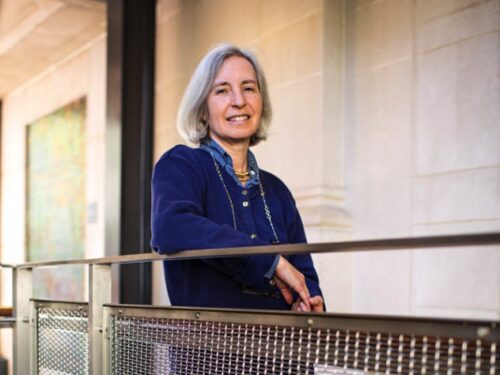Do you trust the news?
In an era of post-truth politics and partisan polarization, only 7% of American adults say they have “a great deal” of confidence in newspapers, television, and radio news reporting. Trust in the media reached record lows in 2016. Americans consume more news than ever before, just in different forums and from different sources. Why is there distrust in the news and news institutions? And, most importantly, what can we do about it?
Harvard’s 300th Anniversary University Professor and former Dean of Harvard Law School Martha Minow, MEd ’76, thinks the problem can be amended within constitutional parameters. Her new book, Saving the News, offers remedies for the news crisis in America, and Minow shared her insights with the Harvard Kennedy School’s Institute of Politics on March 2, 2022. “Informed and active citizens are a crucial ingredient for political order that is controlled by the people,” Minow said during her lecture. “The press is in serious jeopardy.”
The very nature of news is transforming, and our institutional infrastructure has failed to keep up, Minow argued, citing her research on the news media. “The traditional media has shrunk,” she said. While three national networks once dominated the news media and promoted a unified understanding of the world, internet platforms are now insulated from liability compared to traditional cable news. Little regulation exists for journalistic misconduct, such as defamation and false information. Further, the revenue stream from most news sources has changed: online platforms rely on ad sales (read, page views) to garner funds, as opposed to public funds, as they did in the past. These changes should be viewed as violations of democratic values, Minow said: “the first amendment ensures access to information, not just freedom of speech.” She asked the audience, “How can we have democracy when news and information is not shared and not reliable?”
The government has always dictated the dissemination and creation of news, for better or for worse. “Government action and support of civic organizations is necessary to overcome the demise of the news industry,” said Minow. Not only has the Supreme Court controlled first amendment rights, but legislative and bureaucratic administrations have actively promoted news. The American government financed the first telegraph lines and gave media sharing discounted rates of exchange in the 1840s. It’s far from unprecedented for the government to protect and promote fair media.
But how can this government mediation adapt to the modern era? Minow proposed legislation that protects consumers. She noted that terms of service agreements are rarely enforced, and suggested that the government requires news outlets to disclose their information sources. This legislation would “require the removal of fake accounts [and] actually require disclosure of where messages are coming from and transparency about choice architecture,” Minow said. In other words, users should better understand how algorithms use their choices to present and deliver new information.
She also recommended that the government support publicly funded news, which has been historically identified as particularly trustworthy and accurate. Support for media education, an “important tool for cultivating critical reading and understanding of news,” can help. As Steven Waldman, chair of the Rebuild Local News Coalition and co-founder and president of Report For America, noted during a panel after Minow’s lecture, “the house is on fire.” According to his research, local news infrastructure is collapsing. Not only has the number of reporters declined drastically, but the coverage density of local issues has decreased over the past ten years. Federal investment in these local news branches could reduce local government corruption and bolster public belief in the media as a reliable source of information.
Finally, Minow suggested that the U.S. should follow the lead of Australia and the European Union to rework news revenue frameworks. Mandating that companies like Google and Facebook pay for news written by others would redistribute the revenue stream that has shaped the media landscape over the past two decades. “We can draw lessons from the music industry, and how the digital disruption that seemed to devastate the music industry righted itself by charging a reasonable fee,” Minow suggested. Under the proposed Journalism Competition and Preservation Act, news publishers could negotiate against tech giants for compensation for the use of their content. This change would allow Americans to “balance the media marketplace without government censorship,” Minow said.

Reworking the news media system has broad implications for society. Not only will it allow Americans to build trust in the news, but it will reform the political polarization in American society, Minow envisioned. Proper news reporting reduces echo chambers and political polarization. It allows individuals to develop a shared understanding of reality itself, and then to collectively protest, reconstruct, or preserve the institutions at play. “None of these proposals alone and even all of these together is going to reverse the situation in which we find ourselves,” Minow explained. Yet, in her view, implementing all of them together could make a difference: Each approach is constitutional, “none of them intrude on freedom of speech,” and “all build on steps that have been taken in the past.”
Minow closed her talk with a reminder that the American constitution is an experiment. “Frankly, the success of this experiment depends on people … engaging in these issues and breathing new life and energy into the constitution and its aspirations for liberty, equality, and self-governance.”
LINK TO WEBINAR: https://iop.harvard.edu/forum/constitutional-case-saving-news
Mary Cipperman ’25 (mcipperman@college.harvard.edu)is comping the Independent.

